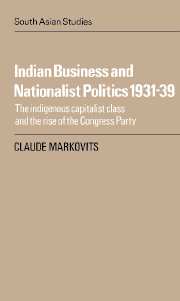 Indian Business and Nationalist Politics 1931–39
Indian Business and Nationalist Politics 1931–39 Book contents
- Frontmatter
- Contents
- Preface
- Abbreviations
- Introduction
- 1 Indian capital
- 2 Crisis and opportunities
- 3 Business, Civil Disobedience and the reforms 1931–1935
- 4 The turning point: capitalists and Congressmen 1935–1937
- 5 Business, the central government and the Congress 1937–1939
- 6 Indian business and the Congress provincial governments 1937–1939
- Conclusion
- APPENDICES
- Biographical notes
- Bibliography
- Glossary
- Index
- Frontmatter
- Contents
- Preface
- Abbreviations
- Introduction
- 1 Indian capital
- 2 Crisis and opportunities
- 3 Business, Civil Disobedience and the reforms 1931–1935
- 4 The turning point: capitalists and Congressmen 1935–1937
- 5 Business, the central government and the Congress 1937–1939
- 6 Indian business and the Congress provincial governments 1937–1939
- Conclusion
- APPENDICES
- Biographical notes
- Bibliography
- Glossary
- Index
Summary
Although some of India's major business families can trace their ancestry as far back as to the Moghul period, the origins of the modern Indian business class are unmistakably colonial. Its rise is closely linked to developments which took place in the Indian economy in the post-1850 period. The following section is a brief sketch of the rise and growth of this class.
The rise and growth of an Indian business class (1850–1930)
After 1850 there occurred a big spurt in the internal and external trade of India, due to the growth of commercial agriculture, and the first beginnings of a large-scale mechanized industry were witnessed. In clear contrast to the case of most other European colonies in Asia and Africa, in India indigenous businessmen were capable of exploiting some of the new opportunities offered by the development of trade and industry. While foreign trade itself was largely monopolized by European commercial firms, the financing and forwarding to the ports of the commercial crops (mainly cotton and jute) as well as the redistribution of imported goods within the interior offered a vast field to indigenous merchants and bankers. Some trading communities of Western and Northern India showed a remarkable ability to seize on these opportunities. Among them were: the Parsis, who had developed a special relationship to the British, firstly in Surat and later in Bombay where they had played the role of junior partners in the China trade; other communities of Western India, such as the Bhatias of Cutch or the Khojas, and the Marwaris of Rajasthan, whose spread throughout Northern, Eastern and Central India had received a new impetus from the establishment of the Pax Britannica.
- Type
- Chapter
- Information
- Indian Business and Nationalist Politics 1931–39The Indigenous Capitalist Class and the Rise of the Congress Party, pp. 7 - 40Publisher: Cambridge University PressPrint publication year: 1985


